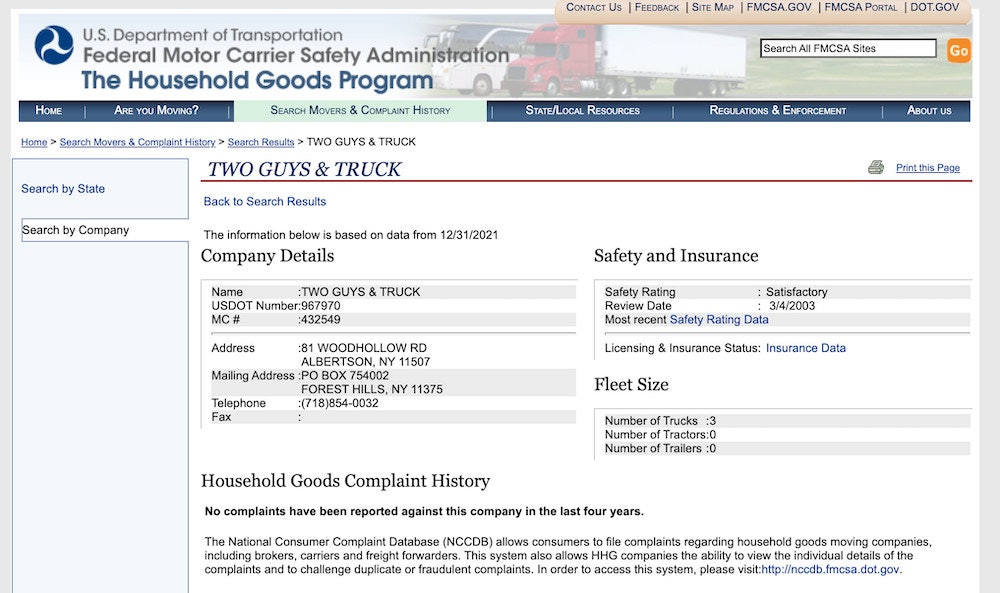- Look Up Customer Reviews
- Verify the Moving Company is Appropriately Registered
- Check for a ProMover Certification
- Look Up Company Information
- Assess Their Business Practices
- Beware of Moving Scams
- Frequently Asked Questions
Moving house can be a stressful experience from start to finish—the last you want is to be screwed over when hiring a moving company. Therefore, before you book a moving company (whether local moving companies or interstate movers) to entrust with your belongings, do some research to ensure a smooth move.
Look Up Customer Reviews
One of the easiest things you can do to ensure you’re picking a legitimate moving company is to look at customer reviews and complaints online. Sites like Yelp and the Better Business Bureau (BBB) are good sources of reviews. However, be aware that some reviews may be fake to boost the company’s reputation.
Read through the negative reviews thoroughly as these can indicate red flags of bad moving companies. Always pay attention to the date of the complaint and whether or not it was resolved or not.
Verify the Moving Company is Appropriately Registered
Trustworthy moving companies will be registered with the Department of Transportation. Find the moving company using the Federal Motor Carrier Safety Administration’s search tool to see:
- Company information, such as the address and phone number
- Their fleet size (i.e., how many moving trucks they have)
- Their safety rating
- Insurance information
- The company’s complaint history

Check for a ProMover Certification
Run by the American Trucking Association (ATA), the ProMover certification lets you easily distinguish between professional movers and “rogue” moving services. To get this certification, movers must agree to adhere to professional business standards and undergo yearly reviews to retain their certification.
Moving companies must also:
- Provide proof they have been in business for at least 18 months
- Provide two letters of recommendation from other ProMover members or state moving associations
- Verify they are in good standing with their state
Look Up Company Information
You don’t just want to choose the moving company that gave you the lowest quote—you want to make sure they are a legitimate business in the U.S. also. Verify the company’s information, including their:
- Website
- Phone number
- Office address
Beware of Fake Websites
Just because a moving company has a website, it doesn’t mean it’s legitimate. Unfortunately, it’s pretty easy to set up a fake website to trick people into handing over their money.
Ensure they have a legitimate business address located in the U.S.—you can use Google street view to look at the business’ location.
Assess Their Business Practices
In some cases, you won’t be able to tell if a moving company is legitimate or not until you’ve started communicating with them. In some cases, you may not realize they’re sketchy until the day of your move.
If the company does any of the following, it’s best to stop doing business with them and find another mover:
- They use pushy sales tactics, urging you to book now or lose your quoted price.
- They don’t ask for details about your move, such as the to and from address and the number of rooms you need to be moved.
- They don’t provide you with liability information.
- They ask you to pay an upfront fee or deposit to secure your booking.
- They ask you to sign an incomplete (or even completely blank) contract.
- They don’t inform you of any additional costs that may be incurred.
- They only accept payment via cash, money transfer (e.g., MoneyGram), or money order. (They don’t accept credit or debit cards.)
Beware of Moving Scams
There are various moving scams to be careful of when booking a company to move household goods. These include:
- Fake moving companies: Scammers set up fake websites to make you believe the company is legitimate, ask you to pay a deposit, but never send a moving truck.
- Intentional wrong estimates: Some companies purposely give you low quotes or estimate to win your business. Then, when all is said and done, and your items have been moved, they tack on all sorts of additional charges that you were unaware of.
- Lack of legitimate contract: To cover themselves legally, some moving companies may try to get you to sign a blank or incomplete contract. They do this to add charges and other clauses into the agreement after the fact. If you try to complain or sue, they will show the signed contract, leaving you without a leg to stand on.
- Excessive additional charges: Although it is common for the cost of your move to be more than what you were initially quoted, movers shouldn’t be adding things like additional mileage (unless you changed the address) or weight charges (unless there is freight involved).
Whether you’re just moving down the street or need an interstate moving company, doing your research is crucial to prevent falling for a moving scam.











Comments